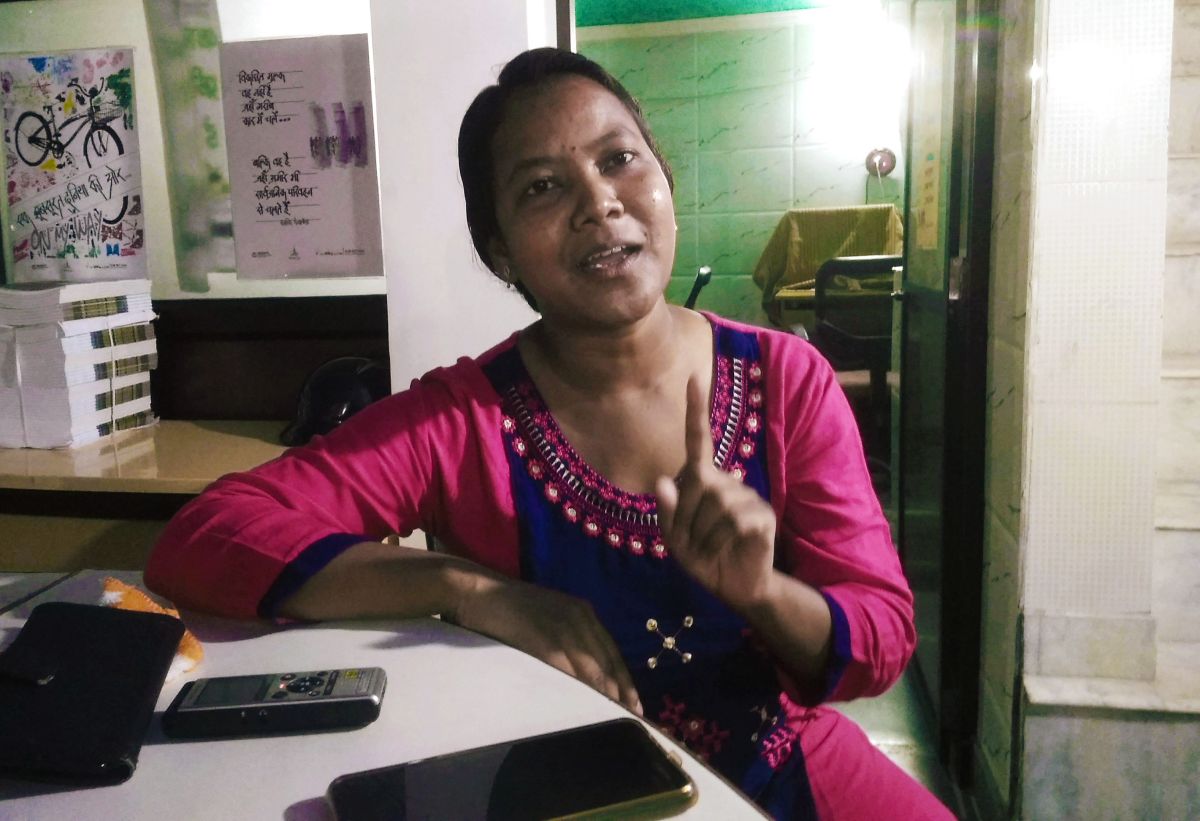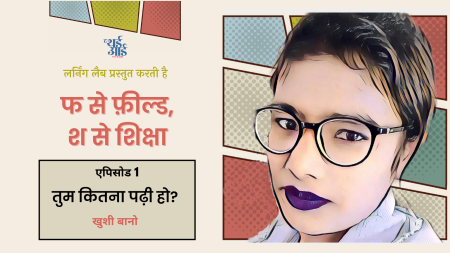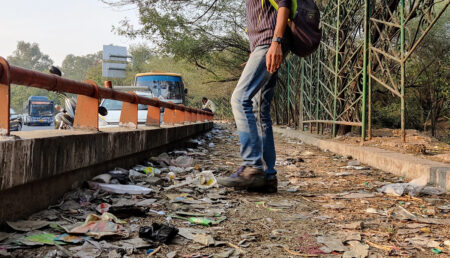“Everyone verifies the domestic worker, right? But where is the verification of the maalik, of the employer? Why should anybody go into the home of someone who is not verified by the police?”
Sunita Rani is the founder of the National Domestic Workers Union, based out of North Delhi, one of several such collectives scattered across the country. She started out alone, with the simple purpose of telling women engaged in domestic work one thing – that what you do is work. From one woman, thousands became convinced. Today, this union of domestic workers is standing at the periphery of a gargantuan city, challenging maalik and police for abuse and wrongful arrests, and offer up a humble list of demands that we should all be putting up on our bulletin boards.
I went somewhere yesterday – fieldwork. There was a lot of talk. There was a man there, and he was speaking in such a topsy-turvy way. He was totally unable to comprehend why women leave their homes and comes to the cities. “The girls are bad, why do they come to Delhi, why do they come here?” he kept asking.
I said, listen, what state are you from? Uttar Pradesh, UP, he said. I said UP is very big. If there’s no livelihood to be had in UP, where are the young people going to go? Where are the girls going to go? They’ll head for the city? So they do from Jharkhand – in search of livelihoods, these girls from Jharkhand… How do they come? They come via placement agencies. What does the placement agency do? They take a commission, a year’s salary, fifty thousand from the maalik, that too they take. The girl gets no verification of where she’s going, what kind of person she’s going to work for… There’s a verification process she has to go through, but none her employer must endure. She’s trapped? So many girls get trapped in bad situations, in Delhi. She’s not even able to go back home, to her village. Because the placement agency has a process of contract renewal. It keeps hold of her salary. Her salary is frozen for the entire year.
Placement. Now she wants to go home. She’s sick of her life. Send me back, to my village. She says it again and again. Send me, send me back. They don’t listen. He’ll bring her to his place, or an agency hostel. Send me back to my village. Give me my salary. What will he release, out of the fifty thousand? Twenty. He’ll keep thirty. In the interim, he’ll have her stay where he chooses. He’ll make up some story. Stay for a while. I’m making arrangements, stay a fortnight, for twenty days. He’ll keep her a month. Then he’ll charge her for the stay! I fed you, I fed you meat. He’ll gobble her wages. He’s guzzling it all anyway. The girl will finally leave for home with barely anything.
Home. Say, she’s gone home to her village. But wait – she’ll be back. Unemployment is rife in her village – there’s no way to earn a living. There are the fields – but how many people can agriculture employ? She’ll return to the city. The placement agency again. Again, the labyrinth, the merry-go-round. And then – if the placement agent doesn’t check on her once she’s been placed in someone’s home – something happens to her, her employers beat her, burn her, kill her, dump her – the agent is not responsible. He takes no responsibility for her welfare. She can die there.
This is why - we’re asking the government - twenty years, we’ve been asking - the government needs to legislate domestic work.
The Police
Now consider this. She’s been working in the same house for three years. All she said was, will you increase my salary please. The maalkin said, yes I will, tomorrow. The next day, she and her husband reported their home worker to the police, for stealing. A false accusation. All the attendant procedures: ten policemen came to her basti, to her home, ‘searched’ it, conducted an ‘investigation’ through her neighbourhood. What kind of respect, what kind of reputation, what kind of face does she have left?
She went to submit a counter-report to the police station. She was refused. They refused to let her register a complaint! What does the SHO tell her? I didn’t arrest you, did I? I haven’t immediately accepted that you’re a thief and put you in jail? What can I do about your maalik?
He didn’t catch you, we didn’t find anything, it is over. What’s your problem?
How is she supposed to find work in the neighbourhood again?
She was one of our union members. She called us. We went to the police station with her. We submitted an application to the Delhi Commission for Women. We held a protest. We held a rally. We occupied the police station. Register her FIR! Give her an acquittal in writing! Declare, officially, that she has been the victim of slander, and is blameless! No one is going to take her word for it after the scandal that’s been played out!
One full year it took. Letters to the DCW, letters to the SHO, then we ourselves prepared the letter acquitting her, and the SHO finally signed and stamped it. One year, for a throwaway accusation. All because the government can’t declare that we have the rights of workers, that our work is dignified, worthy of acknowledgement.
Violence
There’s a case like that in Gurgaon right now. They beat her and beat her and kept her locked up. Someone had to rescue her first - there is an organization that rescues girls. We filed an FIR. And because the maalik has money, has connections, has impunity, he registered a case against her. Accusing her of stealing. Falsely.
And we have to fight that case, without money, resources, media attention. And the maalik’s lawyer stands up in court and says, “Yeh ladki galat hai.”
What does that mean, galat ladki? The lawyer told the judge that these girls who come from Jharkhand, they come for sex work. They’re prostitutes. The judge believed him, we think. So now the case is flagging. We don’t know how it will go.
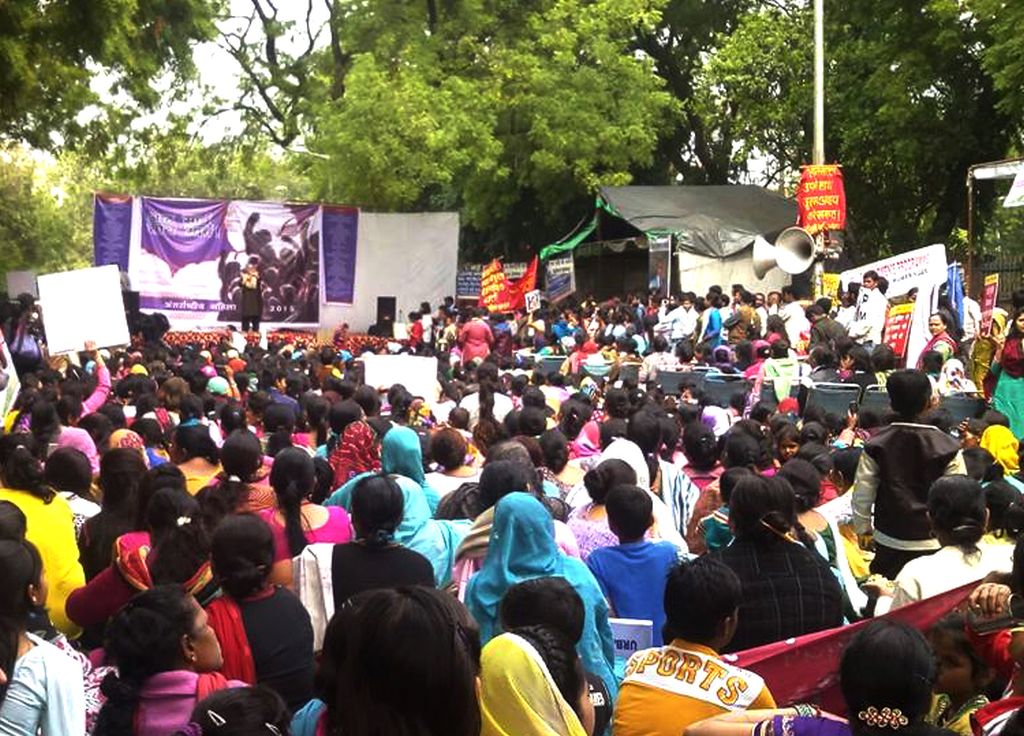
Becoming an activist
Our family was very poor. My father worked with a woman named Nirmala – learning and teaching in bastis. I liked it, I liked what they did. I wanted to do it… I would climb into my father’s arms and we would set off for a dharna or a rally. It didn’t feel like ‘work’. I watched women go to ‘work’ every day. It was part-time, in big houses. I heard them. “I get no leave… She beats me…” I didn’t know what to do. What could I do? Branch out by myself from my father’s collective?
I joined an organisation – it had a crèche and a pre-school, a balwadi. It doubled as a placement agency. They provided insurance for employees, as well as the girls who came from villages to be placed in city homes as domestic help. “I haven’t got my salary,” they would say. Who took it? I would ask. “It’s here.” They know you’re naive and gullible, I would say. They save it for you here… Why don’t you ask for it? I asked one of them. She just couldn’t. One day, I received a notice from the insurance provider: your premium hasn’t been paid, for several months. I asked the organisation people – why not? “We forgot,” they told me. “The deadline slipped away.” I asked the girls about their insurance. Amounts were being subtracted from their incomes too – incomes they didn’t have access to anyway.
I thought, how many girls is it? How much money? I quit the job there. I left my money with them, just quit. I joined Lokayan, worked on issues around transport for a while. But I kept returning to the women – their situation – which I’d been thinking of since I was a little girl. In 2006, I struck out on my own.
My three-year-old Priyanshi, she has travelled up and down the country with me! She knows all the songs and slogans from the field… Knowledge from everywhere has sunk into her being. I introduced her to the labour movement, the way my father introduced me to it. Whenever I am at a police station, I insist on leaving before dark so that I can be home with my daughter. Otherwise, they keep you till five. I just leave! Why are you holding me here? I ask them.
The First Union Member. The First Thousand.
Not only Domestic Workers
The organising, you think it’s only domestic workers? This about this.
A woman selling fruit on the footpath, off a stall by the road, a tea seller, a flower seller. Some man, any man, comes and harasses her. A policeman molests her, upends her cart, robs her of all her goods. Because, she was alone.
How does she pay off the MCD official? Where does she get the five thousand, the ten thousand he demands? What petty cash she has, her livelihood depends on. The livelihood of a domestic worker, of a flower seller, of a vegetable seller. Livelihoods are various. All these women’s livelihoods matter and find representation in our union. We ask them all to join us.
You realise, all workers age? How is the pension for unorganised sector workers supposed to work? The labourer earns twenty rupees a day, and he’s supposed to pay you one hundred, for a benefit that may or may not accrue to him – there’s no clarity, when you go and talk to the labour department – they say, sure, take a form, fill it out, but we don’t know when this Rashtriya Swasthya Bima Yojna will really come into effect… We haven’t received any notification about how to set the benefits in motion; we can’t guarantee it’ll do any good. But sure, take a form, fill it out, submit it if you like… Besides, your union has to be registered…
The state of the union
Though membership is flourishing, the union is not registered as one. Why not, you ask? We were told we couldn’t call ourselves ‘Rashtriya’ (National). We can’t be national in scope. Work on Delhi, they said to us. We said, why would we do that? How will we do that? The women who work in homes in Delhi, they come from Jharkhand, they come from Bihar, they come from Bengal, from Orissa. What does it mean, work only on Delhi? We want a wider, collective conversation.
But there is another problem, and one that is anything but simple. Our members don’t get time off. Even if they can get a day or two off, all aren’t free at the same time. When there’s a big conference or meeting they will sometimes tell their employers they’re ill, someone in the family is ill, someone has died – we don’t like to ask them for this! They’re going to lose money for every day they take off, and their rent depends on their salary, their food, tuition for school, medical expenses, everything depends on their salary. So, I don’t like asking them to come. But when they have to ask, I always say, say whatever! Say someone has died! If it’s important to participate, then participate!
It’s the same with women who aren’t domestic workers. They won’t come to a dharna for a domestic worker’s rights, but this isn’t about a domestic worker’s rights!
The right to earn your living safely, the dignity of work, social security - these are not just the rights of domestic workers but those of all women, and all workers. All these workers in the unorganized sector need to stand up and speak out, for their own rights.
Is domestic work work? Is activism work?
I had to explain to them that the work they do - managing entire households sometimes, facilitating other people’s economic and social lives - is important work .
It’s the same work an airhostess does – service, cleaning – but she does it smartly turned out, speaking and being spoken to in English, with respect. The domestic worker is treated like a servant. Many of them are ashamed – they don’t tell their families. I say to them, this is labour. You are engaged in shram, mehnat. To be able to feed your family, give them a basic standard of living, in exchange for hard work is your right. Step forward, raise your voice. If you don’t want to do it alone, do it together, ten or fifteen or twenty women. Demand fair treatment. And all the workers who join the union say that before I joined the union I was so scared, I was so frightened I would get fired, I would get hauled off to the police station. I didn’t know how to speak, I couldn’t speak.
Now they get it! Now, they tell their maalkin, give me a fair salary, give me four days off a month, or let me go. I don’t want stale mithai – if you don’t want to give me any, don’t, but I don’t want spoilt food! To the police officer, to the SHO they say, without fear, why have you not filed the FIR? Why are you treating her like a criminal without any proof? They come to protests, to rallies, and speak out! And they all spoke – they all said the same thing. I have learned to put forward my point of view, I have learned to make my experience public – I have discovered my right to do so, and the value of doing so.
If you fear, you will be able to do nothing. If you do not fear, you can do everything.
Haq
The right to work and receive just compensation, a safe work environment, social security – for women working on a contractual basis for schools, cleaning for twelve hours a day, for girls placed in homes 24 hours of the day, months together. I tell them, you don’t have leave, you don’t receive minimum wage. How is the domestic workers’ struggle alien to you, to yours? Safety is a women’s issue. Livelihood is a women’s issue. We have to include them all.
We need laws, and we need a common cause platform with other workers in the unorganised sector. And if the government cannot do these things they ought to delegate the work to collectives, organisations, unions, that have already been doing this work. For decades! They have the experience – they simply need legitimacy and help with infrastructure. They’re ready! But where is the political will?
The 24-hour Worker
- What the work is
- How it is to be done
- There must be two meetings a month with the worker placed in a home, to ascertain her welfare. Local police right now have no idea who works where or how! And even when they know, they think it is none of their concern. How could it be any different? When the government doesn’t care, the placement agency doesn’t care, the beat officer thinks, why should I bother? Why should I take on the responsibility of acting for a lowly domestic worker and against her more powerful employer?
- There must be regular counselling, to act as a check and balance for the meetings.
- The government should institute rules for how each police station is to keep track of how many women are working in any given district, where, and what their working conditions are.
- The government itself should institute domestic workers’ collectives in each district, and organise meetings for them, and social events.
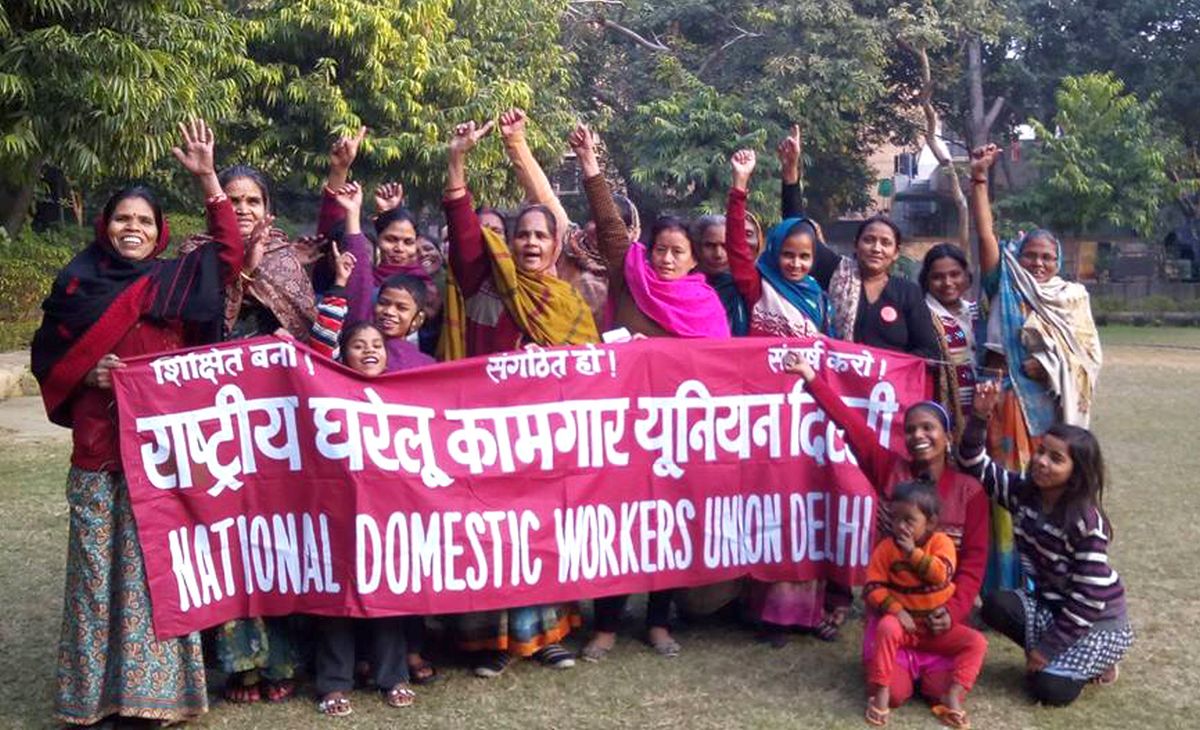
The Lockdown
The lockdown was announced. So sudden, Delhi shut down. Women were suddenly asked to sit at home. There was no salary, maalik didn’t give salaries. Even those who earned 500 rupees, 1000 rupees – nothing, they didn’t get anything. How were they supposed to pay rent? Malik would tell them – don’t come to take salary. Stay away. Within days women ran out of ration in their homes. Many of them are sole breadwinners. The husbands had anyway lost jobs. So, the union came together to distribute ration.
But I want to ask you this. If maalik is saying don’t come till September, October, December, who knows, and the makan maalik is not reducing rent, so where will they go? Then the houses they work in say okay, you can work only in one house – just my house. Else, you’ll keep roaming round house to house carrying the virus, so just work in my house. Okay, she says. So, how much will you give me? The same, they say. So, then? How will she afford to live in Delhi? Where she has lived in for 20 years? So many domestic workers pulled their children out of school because they couldn’t pay the fees.
The government did nothing about domestic workers. They gave money to migrant labour, to autowalas, to E-rickshaw drivers, but the crores of women, who are also migrant, who work in people’s homes, they got nothing. There was no order from the governments to the maaliks – that they should pay the salaries. The maalik had no darr, they just stopped paying overnight. The government should have made a formal announcement to the public that domestic workers need to be paid their salaries.
The only thing they announced was Jan Dhan Yojana of Rs. 500. What is Rs. 500? And nobody got it. Jan Dhan Yojana kisi ko bhi nahi mila hai, not one domestic worker got it.
So many women have gone back to the villages. They felt that why should we die in Delhi? If we have to die, we will die in our village. The bastis have emptied out. You should come see. Empty.
With inputs from TTE Team.


